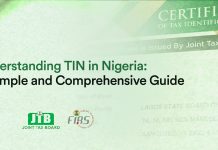The Pharmaceutical Society of Nigeria-Partnership for Advocacy in Child and Family Health at Scale (PSN-PAS) project has urged the government of Nigeria and other relevant stakeholders to deepen the involvement of community pharmacists (CPs) and Patent and Proprietary Medicines Vendors (PPMVs) in the provision of expanded family planning or child spacing information and services.
The association said during a press briefing to mark the fifth Nigeria Family Planning Conference 2018 on Sunday in Abuja, saying the PSN-PAS project seeks the inclusion of PPMV as providers of expanded family planning and other primary health care services in Nigeria.
Ayuba Tanko Ibrahim, the programme director, PSN-PAS, said since a large proportion of Nigerians visit the PPMVs as their first point of call for child spacing information and services, there is need to identify, build their capacities and supportively supervise PPMVs to provide more expanded family planning services.
He said that, access to safe, voluntary child spacing information and services is a human right which would empower women and help support optimal health decision-making for themselves and families, thereby helping to strengthen communities and lay the groundwork for a prosperous, just and equitable future.
According to him, “Unfortunately, many women in Nigeria lack access to quality healthcare, including sexual and reproductive health services. With fertility rate of 5.5; maternal mortality ratio of 576 per 100,000; and 111 women and young girls dying daily from preventable pregnancy and child birth related complications, Nigeria now accounts for 15% of global maternal death (WHO).
“Despite the commitments made by the government of Nigeria during the July 2017 FP 2020 London Summit to achieve 27% mCPR by 2020 the April-May 2018 PMA 2020 survey report shows that Nigeria mCPR still trails at 19.0%. If in 2018, Nigeria’s mCPR is 19.0%, can we achieve the 27% mCPR target by 2020?”
He reaffirmed that family planning is one of the most cost-effective ways to prevent maternal, infant, and child mortality as it can reduce maternal mortality by reducing the number of unintended pregnancies, the number of abortions, and the proportion of births at high risk.
According to him, “Over 60% of Nigerians patronize CPs and PPMVs for their child spacing and other primary health care services. The government of Nigeria is convinced that by building the capacities, supportively supervising the practices of CPs and PPMVs, and thereafter expanding their scope of work, Nigeria will move towards Universal Access to Health and Universal Access to Family Planning.
“There is urgent need for the government of Nigeria to “walk the talk” by ensuring the critical private sector – Community Pharmacists and Patent & Proprietary Medicines Vendors – are equipped, and strengthened to provide more quality child spacing information and services and thus should be included in all respective policy documents. We are convinced that this will be a fruitful strategy to reducing the unacceptable maternal, child and adolescent mortalities from preventable pregnancy and childbirth related causes,” he stressed.













